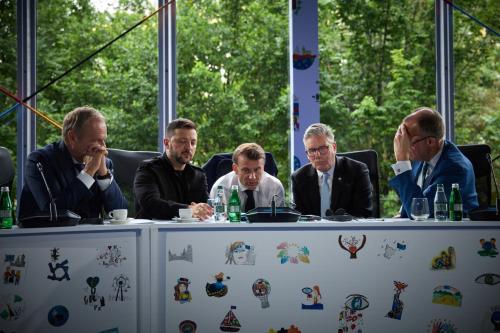Brookings experts continue to offer commentary and recommendations on the unfolding crisis in Ukraine and Crimea. See previous editions of this roundup here, here and here.
Brookings President Strobe Talbott, who dealt with Vladimir Putin through various offices held by the Russian president—national security adviser, prime minister, acting president and president—writes on Yale Global that if “Vladimir Putin goes through with the annexation of Crimea, he will have will have opened a new and dangerous era of Russian international behavior.”
He will have established, not just in doctrine but in action, his willingness and ability to redraw the map of Eurasia by force, unilaterally converting territory of another state into an integral part of his own country.
In response, the United States and much of the rest of the international community will have to adjust their own foreign, defense, trade and economic policies in ways that will be necessarily costly to all concerned, most of all to Russia itself.
Putin, Talbott writes, “is not focused on the future. Rather, he is using the upheaval in Ukraine to pay back the West—and particularly the United States—for what he sees as a quarter century of disrespect, humiliation and diplomatic bullying.”
Watch video clips and get full event video plus audio from our event on the crisis featuring a panel of Brookings experts.
Steven Pifer, senior fellow and a former U.S. ambassador to Ukraine, wrote for Lawfare blog about the crisis with a focus on the upcoming referendum in Crimea and then what happens next. “One way or another,” Pifer wrote,
the referendum will produce a vote to join Russia. And the referendum will lack legitimacy. It will be conducted as armed Russian soldiers patrol the streets and Ukrainian television channels have been shut down, replaced by Russian broadcasting with its decidedly propagandistic slant. Crimean Tatars, composing 12 percent of the population, will boycott the vote.
The referendum is illegal under Ukrainian law. That does not seem to bother Moscow, though the Russians would be quite bothered were the Chechens to call for a referendum on independence—something the Kremlin fought two bloody wars to prevent.
For the past two decades, most of Europe has generally agreed that ethnic minorities have no right to unilaterally separate themselves, a principle the Russians have strongly backed when it has come to Russia. The principal exception in Europe was Kosovo, a victim of Serbian ethnic cleansing in 1998-99. More than 100 countries have recognized Kosovo’s unilateral declaration of independence, which came only after a decade of failed negotiations with Serbia.
Pifer reviewed Moscow’s three post-referendum options and also what Europe and the United States should do next:
The United States and European Union should support Ukraine’s territorial integrity, as they are committed to do as members of the Organization for Security and Cooperation in Europe (OSCE). In addition to imposing penalties on Russia—including more severe sanctions should Moscow proceed to annex Crimea—Western countries should refuse to deal with Crimean officials, bar investment by Western companies there, and allow Ukraine to exercise a measure of border control by making ship port calls and international airline service subject to approval by Kyiv.
Such policies will not have an impact immediately and may not succeed in restoring Crimea’s status. But they are the right thing to do. The West needs to prepare a patient and persistent campaign that makes clear that unilateral attempts to redraw Europe’s borders will have consequences.
Read the full piece on Lawfare.
Here is some of what scholars are saying on Twitter:
.@BrookingsFP’s @BruceJones on what Obama needs to do to lead on Ukraine crisis – & dispel impression of hesitancy. http://t.co/6ecAa4qeE9
— Strobe Talbott (@strobetalbott) March 11, 2014
Putin’s about to cross a true red line – Russia’s border w/ Ukraine. My take on a tipping point for world politics. http://t.co/egRv5BWF9e
— Strobe Talbott (@strobetalbott) March 11, 2014
Thoughtful analysis of Western failure to understand Putin’s trap | http://t.co/Cnl1192Dqh
— Mike Doran (@Doranimated) March 11, 2014
Ukraine is not US’s fight, say Americans (including Republicans) by heavy margin in new @pewresearch poll. http://t.co/CAN8eD324g
— Jonathan Rauch (@jon_rauch) March 11, 2014
RT @ProPublica: Ukraine’s economy is stuck in 1993 http://t.co/rZeAMD79K7 @Wonkblog pic.twitter.com/HMoJjI82El
— Javier Solana (@javiersolana) March 11, 2014
The Brookings Institution is committed to quality, independence, and impact.
We are supported by a diverse array of funders. In line with our values and policies, each Brookings publication represents the sole views of its author(s).




Commentary
Brookings Scholars on the Ukraine/Crimea Crisis, 3/11/14
March 11, 2014